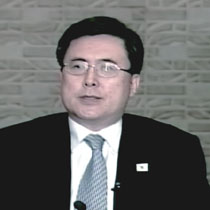-
(单词翻译:双击或拖选)
Washington
24 April 2007
South Korean officials say their agreement Sunday to send rice to help North Korea feed its people will only go through if Pyongyang honors a pledge to begin dismantling1 its nuclear weapons program. And President Bush's special envoy2 monitoring human rights in North Korea says Pyongyang must change its ways before normalization3 of U.S. relations can take place. VOA's Leta Hong Fincher has more.
Seoul says its decision to send 400,000 tons of rice to impoverished4 North Korea is not just a humanitarian5 gesture.
South Korean officials say the aid agreement they signed this week (4/22) depends on whether North Korea begins dismantling its nuclear-weapons program, as promised.
 |
| Chin Dong-soo |
Under that deal reached at six-party arms talks, North Korea was to close its main nuclear reactor8 by April 14th and allow U.N. nuclear inspectors9 into the country, but this has not happened. Pyongyang says this is because it has been unable to regain10 control of $25 million from a previously11 frozen account at a bank in Macau. The United States said the North Korean funds at Banco Delta12 Asia were part of an illegal money-laundering scheme, but it has lifted the "freeze" on the account.
 |
| Jay Lefkowitz |
"I certainly don't expect, unless there's a change in policy, that we're going to have any transparency in terms of how they spend that money, and I think it's incumbent13 on us to insist precisely14 on that," he says.
Lefkowitz told the conservative Heritage Foundation research group in Washington that North Korea must remove its curbs15 on freedom of expression, assembly and religion before the United States will normalize relations with the communist state.
"The agreement makes clear that we are to begin holding normalization talks, and the Japanese and the North Koreans are to begin holding normalization talks, and I think these human-rights issues are very much front and center in both of those normalization dialogues," said Lefkowitz.
Some conservatives have criticized the Bush administration for appearing to drop its hard-line stance on North Korean human-rights abuses in order to resolve the nuclear standoff with Pyongyang.
Lefkowitz says the United States and its allies can do more to push North Korea to treat its citizens better. "There is no question that there's a great deal more that we can be doing, and frankly16 [this] requires work throughout the administration – leadership not only by the president, who is very committed to this agenda (I see that every time I talk to him about it) – but leadership throughout the government in elevating this issue, not only through the six-party talks but also, with our other friends and allies in the region."
The February six-party accord calls for talks between the United States and North Korea to normalize ties after decades of hostility17, in exchange for Pyongyang's abandonment of nuclear weapons.
 收听单词发音
收听单词发音
1
dismantling

|
|
| (枪支)分解 | |
参考例句: |
|
|
|
2
envoy

|
|
| n.使节,使者,代表,公使 | |
参考例句: |
|
|
|
3
normalization

|
|
| n.(normalisation)正常化,标准化 | |
参考例句: |
|
|
|
4
impoverished

|
|
| adj.穷困的,无力的,用尽了的v.使(某人)贫穷( impoverish的过去式和过去分词 );使(某物)贫瘠或恶化 | |
参考例句: |
|
|
|
5
humanitarian

|
|
| n.人道主义者,博爱者,基督凡人论者 | |
参考例句: |
|
|
|
6
timing

|
|
| n.时间安排,时间选择 | |
参考例句: |
|
|
|
7
implementation

|
|
| n.实施,贯彻 | |
参考例句: |
|
|
|
8
reactor

|
|
| n.反应器;反应堆 | |
参考例句: |
|
|
|
9
inspectors

|
|
| n.检查员( inspector的名词复数 );(英国公共汽车或火车上的)查票员;(警察)巡官;检阅官 | |
参考例句: |
|
|
|
10
regain

|
|
| vt.重新获得,收复,恢复 | |
参考例句: |
|
|
|
11
previously

|
|
| adv.以前,先前(地) | |
参考例句: |
|
|
|
12
delta

|
|
| n.(流的)角洲 | |
参考例句: |
|
|
|
13
incumbent

|
|
| adj.成为责任的,有义务的;现任的,在职的 | |
参考例句: |
|
|
|
14
precisely

|
|
| adv.恰好,正好,精确地,细致地 | |
参考例句: |
|
|
|
15
curbs

|
|
| v.限制,克制,抑制( curb的第三人称单数 ) | |
参考例句: |
|
|
|
16
frankly

|
|
| adv.坦白地,直率地;坦率地说 | |
参考例句: |
|
|
|
17
hostility

|
|
| n.敌对,敌意;抵制[pl.]交战,战争 | |
参考例句: |
|
|
|















